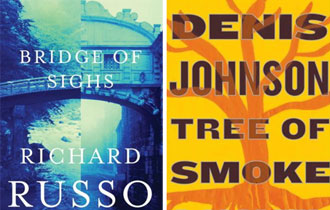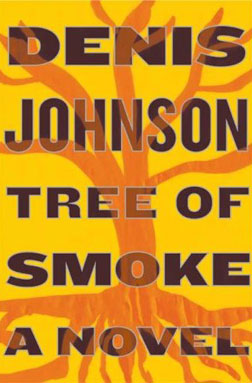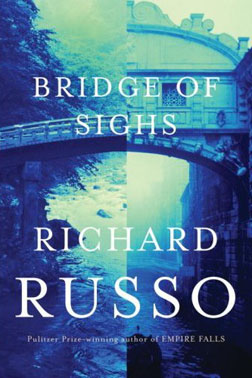Reviews: Denis Johnson’s – Tree of Smoke and Richard Russo’s – Bridge of Sighs
28.09.07
 TREE OF SMOKE
TREE OF SMOKE
By DENIS JOHNSON
Farrar, Straus & Giroux
624 pages
$27
BRIDGE OF SIGHS
By RICHARD RUSSO
Knopf
544 pages
$26.95
Denis Johnson, whose best is arguably still Jesus’ Son, returns with an apocalyptic Vietnam novel, yes a Vietnam novel, replete with spy rings, delirious patriots and shattered lives. It is, to employ a cliché, a tour-de-force.
Essentially, the story revolves around the capers of the "Colonel," a legendary CIA "man with a message," prone to grand theorizing about the psychology of warfare. Not so charismatic is his nephew, Skip Sands, a novice at the game, who, inspired by his uncle, joins the CIA and finds himself in the dungeons of Vietnam.
While the novel flits between time zones and places as disparate as the US, the Philippines and Malaysia; the bulk of it is centered around the American experience in Vietnam, where the Colonel devises a massive counter-intelligence framework, called the "Tree of Smoke".
Assisting him in the operation, which, in the words of a character "is neither desk nor field. It’s somewhere out in the jungles of romance and psychosis" is Nguyen Hao, a Vietnamese, who in turn hires his friend Trung Than for the task.
Trung (referred to intermittently as the Monk for his sublime spiritual forays) is a disillusioned former Communist sympathizer: "I remember when the cadres came to my village in 1945 and read Ho’s speech to us. A young woman got up and read in a voice like a song. The world rang with Ho’s words. In the girl’s beautiful voice he talked about freedom, equality." Johnson seems to be saying, it is because of such epiphanies, that people both go forward and regress in their lives.
These are broken people, racked by guilt and the trappings of conscience. If it was not for the war, they may have found themselves leading virtuous lives, devoid of deception. On an ordinary morning, Hao is seen waking up; "thinking what it means to do battle with––no, not to fight against, but simply to face unwaveringly––the dragon of the Five Hindrances: lust, aversion, doubt, sloth, restlessness." Johnson’s keen eye solidly keeps us company amidst the dense undergrowth of symbolism and mysticism, as when he here transforms a game of bowling into a philosophical inquiry:
 "Skip had never bowled, never before this moment even observed. The appeal was obvious, the clean geometry, the assurances of physical ballistics, the organic richness of the wooden lanes and the mute servitude of the machines that raised the pins and swept away the fallen, above all the powerlessness and suspense, the ball held, the ball directed, the ball traveling away like a son, beyond hope of influence."
"Skip had never bowled, never before this moment even observed. The appeal was obvious, the clean geometry, the assurances of physical ballistics, the organic richness of the wooden lanes and the mute servitude of the machines that raised the pins and swept away the fallen, above all the powerlessness and suspense, the ball held, the ball directed, the ball traveling away like a son, beyond hope of influence."
Not only is the war addressed through the macro, but from the ordinary foot soldier’s point of view as well. In the story of Bill and James Houston, the romance of the distant conflict turning into the horror of reality is elicited in sorrowful tones. It’s surprising how well-worn attempts at retracing the utter shock of conflict succeed in unsettling the reader.
In a novel awash in masculine motifs (understandable, given the subject matter), only one woman manages to get heard. Kathy Jones, a one-time paramour of Skip, is wonderfully evoked through the letters she writes to him. In spite of her absences during much of the text, she appears triumphant in the end, when her message meets the novel’s purpose.
This is a big novel, not just in size (which lumbers to a mammoth 600-plus pages), but also in its scope. Rich in Biblical imagery, Tree of Smoke is an irreplaceable addition to the teeming literature on the "Asian war".
More than anything else, at a time when the US is embroiled in another messy foreign intervention, this book is a reminder of the dangers of false belief and the extent to which we let our prejudices taint our perceptions.
Another old master makes a long-awaited comeback this fall, with his unerring portrait of working class America. Richard Russo’s Bridge of Sighs is his first novel since the widely appreciated, Pulitzer Prize-winning Empire Falls.
Certain themes resonate from that seminal work, like the deterioration of small-town life. In Bridge of Sighs, the fictitious town of Thomaston is in the grip of an impending disaster. The local tannery is spewing pollutants into the town’s lungs, causing many residents to develop cancers.
At one level, the book is an ode to the memory of Russo’s childhood, his imagining of places where "the only taxi service was Hudson Cab. Their ad in the Yellow Pages refereed to a ‘fleet’ of taxis, all clean and spacious, with courteous, punctual drivers—proof, my mother said, that you could claim just about anything and get away with it."
At another level, however—and it is at this plane that the novel truly finds it voice—it is the story of three people whose circumstances bind them together for life. Louis Charles Lynch is the owner of a local grocery store, married to Sarah Berg.
Louis—or Lucy—was a childhood friend with the artist Robert Noonan, known to loved ones as Bobby Marconi. The novel traces the lives of these three––Lucy, Sarah, and Bobby––from a shared childhood in Thomaston to the parting of ways in adulthood.
If one thing is taken from Russo’s work, it’s his magnanimity of spirit. Nearly all characters are imbued with a generosity so large it’ll make you smile (or wince). We first meet Lucy as he begins narrating his story: at 60, smug with life, looking forward to a trip to Venice, his first time outside Thomaston. Slowly, by way of carefully selected––almost tender––words, Lucy takes us into his world.
 Lucy is portrayed as suffering from occasional spells, a result, it is believed, of a traumatic childhood event, during which he was enclosed inside a trunk and abandoned by a group of boys. Rewind to the past where this incident elucidates ties to his family.
Lucy is portrayed as suffering from occasional spells, a result, it is believed, of a traumatic childhood event, during which he was enclosed inside a trunk and abandoned by a group of boys. Rewind to the past where this incident elucidates ties to his family.
Lucy has a devoted relationship towards her father, and Bobby, a tumultuous one with his own abusive old man. In spite of their differences, the boys come to develop a close bond, a bond that will be tested on the altar of love and fidelity.
This ordinary friendship becomes the emotional fulcrum of Russo’s tale when both men fall for the same girl. Sarah is a free spirited daughter of the local English teacher, who wishes for one thing but ends up with another. Russo takes us through these lives with an expert’s hand, revealing the most enticing parts through letters the main characters share. In that respect, this novel closely mirrors Johnson’s.
Life and its tragedies take Bobby to Venice, where he comes into his own as a painter. But the memory of a painting, deceptively titled "Young Woman at a Window", haunts the book like a phantom, threatening to open old wounds and ignite dead passions.
But it isn’t romance alone that provides the artist his muse. As Bobby basks in the glory of his artistic success, Russo ponders:
"Bobby Marconi had always treated his loathing of his father like a precious commodity, something to be hoarded, something you could run out of, or that could be stolen if you weren’t vigilant. Bobby had been a miser […]fearing what sympathy might cost, he’d concentrated on protecting and growing his bitter stash."
The titles of both novels are symbolic (the meanings of which are clarified in the course of the narratives). There is a passage in Joel 2:30-32, which augurs the coming of the apocalypse:
"And I will give portents in the heavens and on the earth, blood and fire and columns of smoke. The sun shall be turned to darkness, and the moon to blood, when the great and terrible day of Yahweh comes."
Indeed, the "tree of smoke" of Johnson’s book is a map of doom, sucking its adherents into a morass from which escape, even when it comes, remains tinged by the threat of lasting trauma.
So it is with the so-called "Bridge of Sighs," a bridge in Venice which gets its name from the sighs of the condemned prisoners’ who walked across it to their incarceration. In Russo’s book, the bridge is both an unattainable symbol of love and the title of one of Bobby’s paintings, whose subject is his father. Contrasting it with "Young Woman", Bobby launches a brooding meditation into art, and finally rids himself of the burden of hate.
What both novels accomplish to devastating effect is to capture the voices of their characters. In Tree of Smoke, that voice is the hurried, rushed lingo of the soldier in the field; in Bridge of Sighs, it is the contemplative murmur of a man drawing out the past. It is our good fortune that we can be party to such diverse paradigms.